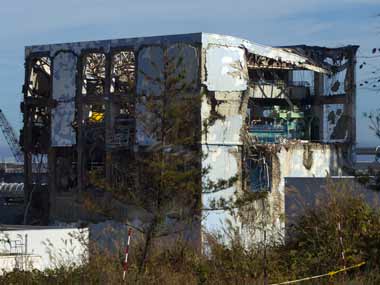Tokyo: Ukrainian nuclear experts say Japanese evacuated from around the stricken Fukushima nuclear plant should be able to return to their homes — unlike the Chernobyl site, which remains inside a wide no-go zone a quarter-century after the accident there. The public may eventually be able to visit the Fukushima Dai-ichi nuclear power plant, where three reactor cores melted after a tsunami last March 11 knocked out the cooling systems, Oleg Nasvit, a nuclear physicist and radiation expert at Kiev’s National Institute for Strategic Studies, said in an interview with The Associated Press. Ukrainian government officials Nasvit and Dmytro Bobro said a crucial lesson from the 1986 Chernobyl disaster is that the government needs to tell people the truth so that they can make informed decisions about their future. “Residents can understand the consequences and make realistic decisions only based on accurate information,” Bobro said on a visit to Japan to attend a seminar on the Fukushima crisis sponsored by the Japanese government. [caption id=“attachment_202169” align=“alignleft” width=“380” caption=“In this file photo, the Unit 4 reactor building of the crippled Fukushima Dai-ichi nuclear power station is seen. AP”]  [/caption] Japanese authorities and regulators have been repeatedly criticised for how they handled information during the unfolding nuclear crisis. Officials initially denied that the reactors had melted down, and have been accused of playing down the health risks of exposure to radiation. An outside panel investigating the government response to the nuclear crisis has also called for more transparency in relaying information to the public. After declaring that the Fukushima plant was stable in December, Japan has set guidelines that allow residents to return to areas with contamination levels below 20 millisieverts per year — about three CAT-scans — which it says is safe, although a further reduction is required. More than 100,000 people were displaced from a 12-mile (20-kilometre) no-entry zone. Any decision on whether to allow residents to return should be based on radiation dose levels rather than distance from the plant, Nasvit said. “If people like to return and they will have a dose of less than 20 millisieverts per year, according to international standards this is possible,” Nasvit said. “This is not about this circle of 20 kilometres but it is about the radiological situation. If this is from the radiological point of view permissible, why not return part of this territory to people?” But further decontamination efforts are a must, he said. This week, the chief of Kawauchi village, which straddles the exclusion zone around the Fukushima plant, told more than 2,500 residents that returning to areas of the town outside the no-go zone would be safe during an ongoing radioactive decontamination. Mayor Yuko Endo said offices, schools and other public facilities will reopen in April. About one-third of Kawauchi village lies within the exclusion zone and remains off-limits. Many residents whose homes were outside the exclusion zone chose to move out of the town. They showed mixed reactions, split between their desire to return to their homes and a fear of the effects of radiation on their health, especially for children. The Chernobyl accident on 26 April, 1986, spewed a cloud of radioactive fallout over much of Europe and forced hundreds of thousands from their homes in heavily hit areas of Ukraine, Belarus and western Russia. It has left forests and farmland still contaminated, offering a warning to the Japanese of the potential long-term effects of their own disaster at Fukushima. The Chernobyl accident fostered deep mistrust among many in the affected areas because Soviet leaders waited for days to tell people about the accident, evacuate them from contaminated areas and warn them how to reduce health risks. The Chernobyl explosion released about 400 times more radiation than the US atomic bomb dropped over Hiroshima. The UN World Health Organisation said among the 600,000 people most heavily exposed to radiation at Chernobyl, 4,000 more cancer deaths than average are expected. Japan’s government has said that it will take up to 40 years to fully decommission the Fukushima plant, but it is unknown how long it will take to decontaminate the vicinity or how much longer soil, water, air and food sampling must continue. It may be a long process, but the operator and the government should tackle the problem quickly, based on science, not emotion, the Ukrainian experts said. “We should not pass the problem on to the next generation,” Bobro said. AP
Ukrainian nuclear experts say Japanese evacuated from around the stricken Fukushima nuclear plant should be able to return to their homes — unlike the Chernobyl site, which remains inside a wide no-go zone.
Advertisement
End of Article
Written by FP Archives
see more


)
)
)
)
)
)
)
)
)



